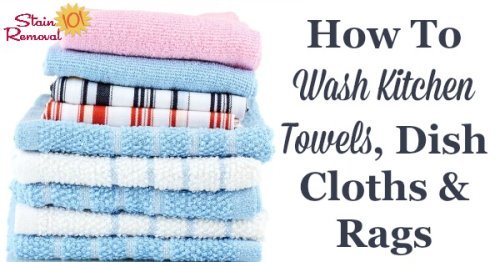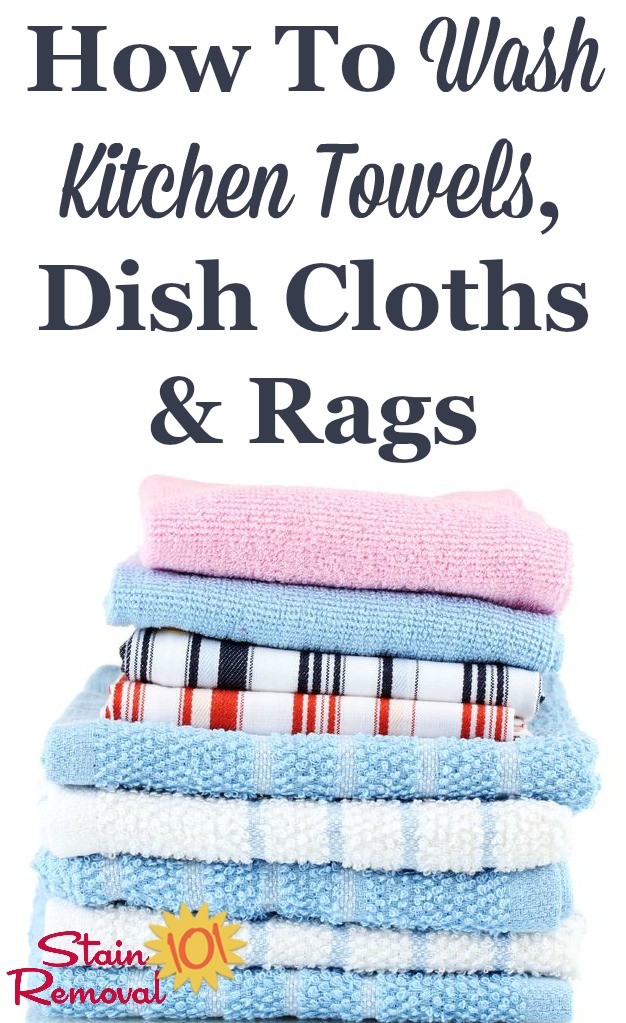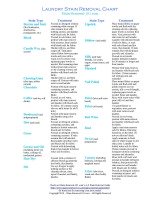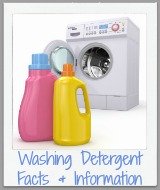How To Wash Kitchen Towels, Dish Cloths & Kitchen Rags
Caring for and then washing kitchen towels, dish cloths and kitchen rags isn't rocket science, but there are some rules to keep in mind to make sure you are doing it correctly.

Use Them For One Job & Change Out Daily
There are many types of dish cloths and kitchen towels, including those used for cleaning dishes obviously, drying the dishes, as well as those used for wiping up messes and even to dry your hands.
To make sure that you do not cross-contaminate surfaces, or smear germs around, it is important to use your dish cloth or towel for one use, and then stop using it until it is washed again. This is especially important when your towel becomes damp, because that moisture is a prime breeding ground for bacteria.
For an obvious example, don't wipe up a spill and then use the same cloth to dry clean dishes. While I'm sure you would never do that, be as mindful of less obvious examples such as wiping off the counter, even when there is no visible dirt on the cloth, and then using it to dry your hands after you wash them.
Instead, after each use where they get dirty or damp go ahead and get them ready to launder and use another one, and definitely change them out by the end of the day each day.
In fact, make it a part of your evening kitchen cleaning tasks to switch to fresh dish cloths and kitchen towels for the next day.
Fortunately, washing kitchen towels isn't difficult or time consuming, so following this rule won't cause you much extra work and will keep your kitchen cleaner and your family safer.
{Related Post: How Often To Wash . . . Everything, Including Printable Cheatsheet}
Caring For Dish Cloths & Kitchen Towels
Once your dish cloth or kitchen has been used, go ahead and throw it into the laundry pile to wash. Often these cloths are used for wet tasks though, so make sure you let the kitchen towel dry thoroughly before it gets buried under a pile of laundry, if you're not washing it right away.
Nothing guarantees a mildewy smelly towel faster than throwing it into a dark space without much air circulation when the item is damp. (If you suffer from smelly dish towels you can follow this same advice I've provided for fixing smelly bath towels here.)
My preferred method to let these cloths dry is to just hang them on the side of the laundry basket, and then once they are fully dry then push them into the basket.
Specific Directions For Washing Dish Cloths & Kitchen Towels
Because your kitchen and dish towels are used to clean dirty, grimy and germy things frequently it is important to wash them in hot water, on the regular (not gentle) cycle, with laundry detergent and, to help remove general stains and soil, oxygen bleach. Then, once washed, dry them on the regular cycle in the dryer, or let them dry on the line in the sun.
This harsher washing, using hot water and heat (or sunlight) for drying will typically be enough to thoroughly clean stains and sanitize your kitchen towels and cloths for their next use.
It is not necessary to use chlorine bleach each time you wash these items, unless you want to. Remember though, chlorine bleach when used frequently weakens fabrics, so that is why I don't normally use it in each load, but only occassionally to help rebrighten whites or if there has been a huge spill I cleaned up, such as of meat juice or something similar.
Even without using chlorine bleach each time though, using hot water and high heat is harsher on your fabrics, so from a practical perspective it is important to purchase high quality and durable dish clothes and towels that can withstand such laundering treatments. Definitely don't purchase dish cloths or kitchen towels that must be washed on delicate, can't be bleached, or must be washed separately since they're not colorfast.
The only other rule for washing kitchen towels and dish cloths is that you should not use fabric softener on them. The reason is that fabric softener will lessen absorbency in the fabric, and that is disadvantageous for what you need these cloths to help you do in the kitchen.
Thanks For Visiting My Website: Grab Your Free Gift!

Hi, I'm Taylor, a busy mom with 3 kids, so I have lots of hands on experience with house cleaning, laundry and my fair share of spots, spills and other messy catastrophes. Thanks for visiting my site.
I update the website all the time with tips, tutorials, cleaning recipes, reviews of products from readers like you, and tests I've done on various cleaners, removers and laundry supplies.
I'd love to give you a gift! When you subscribe to my free weekly newsletter you will receive a free printable laundry stain removal chart that you can reference as needed.
I hope you enjoy this gift, and stop by again soon!
Related Pages You May Enjoy
Tips For Speed Cleaning Your Kitchen
Washing Detergent Guide: Essential Facts & Information
Go From How To Wash Kitchen Towels & Dish Cloths To Home Page
CAUTION: This website is provided for informational purposes only. It is provided as is, without warranties or guarantees. Some stains and messes just won't come out, and are permanent. Further, some cleaning methods can harm your item, so if what you want to clean or launder is sentimental or expensive call a professional. See disclaimer of liability for more information.
Popular Laundry How To's
How Often To Wash Everything {With Printable}
Fix Bleeding Dyes Or Dye Transfer
Let's Stay Connected!
Get Free Email Updates
(and get a FREE printable)
Related Pages
 Detergent Reviews & Information
Detergent Reviews & Information
 Visit Household Management 101
Visit Household Management 101
 Visit Home Storage Solutions 101
Visit Home Storage Solutions 101







Share Your Comments, Tips & Ideas